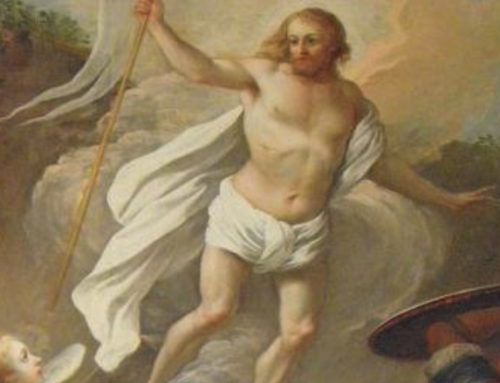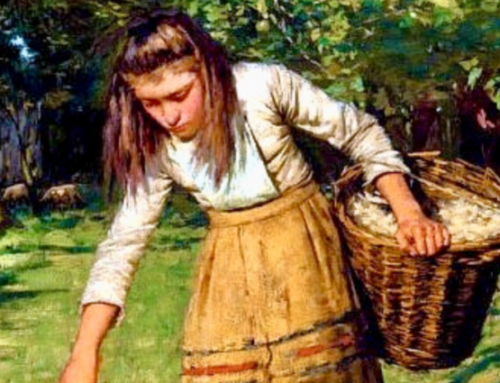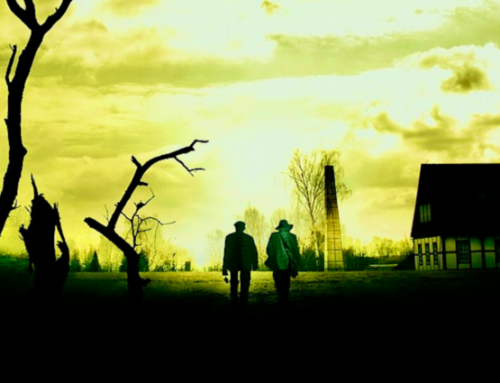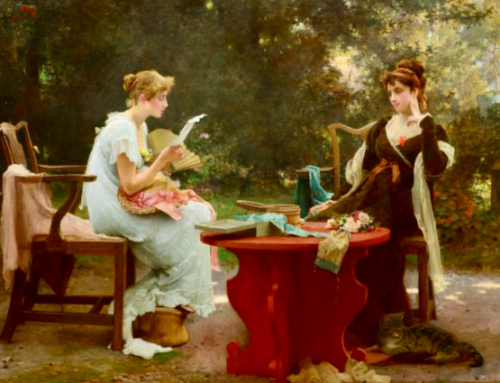We cannot repair the past. But we owe it to the past to make a better future. It is a fine line that we draw every day, reflecting on the past to improve the future, while not dwelling there so much that we forsake the future. The only sure path out of this quandary is the forgotten concept of “metanoia.”
 I think it was during a 7th grade religion class that Mother Marie Julia smiled—a rare phenomenon, usually reserved for those times when she was vigorously applying a yardstick to my thighs and backside—and asked us a simple question to test our knowledge of the Bible: What, she asked, is the shortest sentence in the Gospels? None of us knew, of course. But I perked up immediately. I was not at all enamored of the Baltimore Catechism or the rote memorizing of various prayers, but I have always enjoyed trivia, and this tiny tidbit of Biblical trivia seemed especially intriguing. So, perhaps alone among my classmates, I remained rivetted on her every word and breathlessly anticipated her answer.
I think it was during a 7th grade religion class that Mother Marie Julia smiled—a rare phenomenon, usually reserved for those times when she was vigorously applying a yardstick to my thighs and backside—and asked us a simple question to test our knowledge of the Bible: What, she asked, is the shortest sentence in the Gospels? None of us knew, of course. But I perked up immediately. I was not at all enamored of the Baltimore Catechism or the rote memorizing of various prayers, but I have always enjoyed trivia, and this tiny tidbit of Biblical trivia seemed especially intriguing. So, perhaps alone among my classmates, I remained rivetted on her every word and breathlessly anticipated her answer.
I was not disappointed. In truth, I felt somewhat how Saul must have felt riding along on the road to Damascus. Her answer stunned me and even now, 60 years later, it still resonates with me. For me at least, that shortest sentence is also the most poignant, most dramatic, and most reassuring in the entire Bible. I thought at the time and still do that it explains more about life and love and God than perhaps any other passage.
Jesus wept. Two words that convey Jesus’s utter humanity and humility, God’s inexplicable love for us, and the inherent and inevitable suffering of living this life. Martha probably did not mean to cause further distress by telling Jesus that her brother would not have died if He had been there sooner, but it is also plausible that Martha was not-so-subtly accusing Jesus of forsaking Lazarus by failing to be there, leaving her brother to die alone without even the comfort of his friend. Most Christians I think would insist that Martha was demonstrating a profound and astonishing expression of faith, but I’m not so sure. After all, Jesus dawdled two days more in Jerusalem before setting out for Bethany, and Bethany is a mere 15 furlongs—less than two miles—from Jerusalem, not much more than an hour stroll at a leisurely pace. Martha’s chastising comment reminds me of the strident admonition of one of my own family who bluntly pointed out that I was selfishly in Slovenia and thereby left my own wife to die alone last September. Jesus may have taken Martha’s comment as demonstrating great faith in Him, but given her track record of complaining, we cannot completely discount that she was upset with Him and that this caused Him even greater suffering.
Jesus wept. He grieved. As we all do. There are few things more unnerving—and more reassuring—than that no one who is human escapes grieving. Yet grief is a wonderful thing. A world of creatures that did not grieve would be monstrous; a person who never grieves would hardly be human. Grief is, fundamentally, a sincere missing of someone or something we cherish, and it is a deep expression of love and loss. It is an emptiness that we would be fools to not acknowledge and embrace.
Jesus wept. Because he grieved for His friend. But did He also feel guilt? Shame? Remorse? Guilt can also, sometimes, be a useful catalyst to change and edification. I doubt if Jesus felt guilty despite Martha’s remonstrations, but the rest of us relentlessly feel it from time to time in our lives. To be completely devoid of a sense of guilt would be terrible. I’m reminded of a poem by the Polish Nobel Laureate, Wislawa Szymborska, titled In Praise of Feeling Bad About Yourself:
The buzzard never says it is to blame.
The panther wouldn’t know what scruples mean.
When the piranha strikes it feels no shame.
If snakes had hands, they’d claim their hands were clean.….
Though hearts of killer whales weigh a ton,
In every other way they’re light.
On this third planet of the sun
Among the signs of bestiality
A clear conscience is Number One.
We don’t celebrate that we feel bad, but we should celebrate that we can feel bad; that we, unlike that killer whale, have a conscience and we know we could have done better, but we faltered. This sense of guilt sets us apart from nearly all other living creatures. Guilt also allows us to not be fooled by the soft lies of well-meaning friends. When they tell us that we did our best or that we did all that could be done, we know it is not really true. They mean to support us, but we know there is always more that could have been done and more that could have been done better. So guilt can intensify, even clarify, grief. But it can also twist, distort, and corrupt our grief. The problem with guilt is that it harms as much as it heals. Ironically, I have discovered that if guilt is too obsessive, it becomes more about us than about the ones we have lost.
One incident that especially still haunts me occurred while I was managing our embassy in Manila in the early 2000s, and a young Marine there hung himself. I had no idea that he had been suffering from any depression or that he had any other problems, and in an embassy of more than 2000 people, it is understandable that I couldn’t know well each individual on my staff. But I had once or twice exchanged pleasantries with this Marine, and we had even agreed to try to play tennis together one day. I never got around to that tennis game, and when he killed himself a few months later all I could think of was that I had failed him by not finding time to play that tennis game. Perhaps, I kept telling myself, perhaps that game would have made all the difference. He had also had a run-in with his Marine superior, but when I was told about it, I thought myself too busy to look into it myself, so I had delegated investigating the matter to one of my subordinates. For months afterwards I could not sleep well, but I hardly thought of the pain of the Marine’s family and friends. All I could think about was my own shame and self-loathing and anger. My guilt had made a young man’s death all about me. It took me a long time to realize that my real failure was focusing myself on myself, rather than on those who still needed comforting. Guilt is a wise servant, but a tyrannical master. Guilt has a dark allure. To wallow in it is spiritual masochism, a seductive self-centeredness that draws us ever nearer to those most dangerous of sins, narcissism, and despair.
Metanoia, the Right Balance
So, what is to be done? Drowning in grief, wracked with guilt, overwhelmed with self-loathing, there is no obvious way out. And over and over again I am reminded of Thoreau’s stark observation that “public opinion is a weak tyrant compared with our own private opinion. What a man thinks of himself, that it is which determines, or rather indicates, his fate.” Our first instinct—akin to self-preservation—is simply to deny our guilt. But that is both delusional and inhuman—although it is remarkable how many of our leaders seem to do so effortlessly. Then, if we successfully combat our own efforts to deny our failings, the next trap is to dwell incessantly on what we have failed to do. But this breeds a moroseness that blackens everything and everyone around us. We cannot repair the past. But we owe it to the past to make a better future. We cannot repair what we broke, but we can better safeguard and appreciate what we now have. It is a fine line that we draw every day, reflecting on the past to improve the future, while not dwelling there so much that we forsake the future.
The only sure path out of this quandary is metanoia. I’ve rarely been impressed with anything about Martin Luther. His antisemitism, his betrayal of the peasantry, his abominable defense of the heresy of predestination, all rankle, but he does seem to have better translated and more deeply understood the Greek term metanoia. The common translation is simply “repent” or “repentance.” Luther and others believed the content of the word went deeper and emphasized more the future than the past. If this translation is more accurate, it changes subtly, but fundamentally, what John the Baptist and Jesus were trying to convey to the multitude: Don’t dwell too much on what you have done wrong; focus instead on what you can now do right. The word itself comes from a minor Greek goddess by the same name. She was the personification of a deep regret when we have lost our chance and have failed to do something that we could have done right. So we must look back at what has been done wrong, but not at the expense of forgetting the future. Metanoia is often now translated as a change of mind, a change of heart, as a reorientation of ourselves, and as a fundamental transformation of our perspective. A transformative change that allows us to recognize our failings, but not give up hope of being a better person and living a better life. That is, after all, the magical thing about time. It keeps moving on, even when we want to remain stuck in the past. While we can’t go back and fix what we broke, we are given the incredible gift of doing better in the present and future.
The Imaginative Conservative applies the principle of appreciation to the discussion of culture and politics—we approach dialogue with magnanimity rather than with mere civility. Will you help us remain a refreshing oasis in the increasingly contentious arena of modern discourse? Please consider donating now.
The featured image is “The First Grief” (1892) by Daniel Ridgway Knight, and is in the public domain, courtesy of Wikimedia Commons.







I feel truly honored to “having met” with you Mr. Joseph .
This was the first time that I read one of your articles and was twice emotional.
To me you are a magnificent writer.
God bless you Sir.
You exhaust, challenge, and interest me with every word you write.
Thank you, Mary and Christina for your kind comments. More than any other essay I have written this one caused me more pain and joy as I tried to understand myself. I was at the Trappist Abbey in Berryville, VA, where my wife’s ashes are buried, for a weeklong retreat of silence and solitude when I wrote it. I believe the Holy Spirit inspired what for so long I couldn’t see.
Before starting my comment, Mr. Mussomeli, I do want to say that your writings are always inspiring, deep, and thought-provoking. Your “The Ukraine Crisis: Will America Ever Grow Up?” remains one of the most reasoned, sensible and sound articles I have read on the subject. I greatly admire and appreciate what you have to say.
Now to metanoia. Interestingly, although “Jesus wept” is the shortest sentence in the English version, in the original Greek it is composed of three words Ἐδάκρυσεν ὁ Ἰησοῦς. This does not say that it may still be the shortest Bible sentence! But regarding the real meaning of Metanoia: it is of course a Greek word which we already find in the 5th century B.C. writings of Thucydides, derived from the adverb μετὰ meta (re- or after-) and the verb νοοῶ no-o (to think, understand, comprehend). So: an after-thought/ analysis or ‘to re-think something out,’ therefore: repenting, having a thought-conversion, repudiating; and finally as a noun, Mετάνοια, the act of repenting (spiritually and/or in prostration with one’s body in a prone position in submission to God, as in the Greek Orthodox faith). So in the biblical sense, asking for forgiveness in an act of remorse and atonement.
You speak of a definition that goes much further and deeper. You emphasize the importance of recognizing what one has done wrong, which elevates us into beings capable of grieving – an asset. And you encourage one to dwell not just on the grief of remorse and guilt, but to concentrate on how one can make amends in the aftermath of this grief. It is a comforting interpretation, a hopeful one, and, as you say, one that keeps us from focusing on the self and turning outwards instead. There may be no better way to clear up one’s life and continue as a changed and recharged person. Yet – it is also a huge task to be able to do so without being able to confess one’s mistakes to those whom one wronged. Is Metanoia a cleansing act, one that can redirect one’s focus, when “they” can no longer accept your apology? Whom do you ask for forgiveness then?
To whom do you say, I’m sorry?
Your examples were important, for you it was also too late. You made good possibly by speaking with your family in the case of your wife. And in the case of the marine, by contacting his relatives and speaking to them.
One can also turn to God. And as a believing Christian, to Christ.
That may be part of the real interpretation of Metanoia. To some it may be cathartic, despite no longer being able to speak their guilt to the one they hurt, one who is no longer here to accept their apology.
To me, it seems very difficult in such cases to get over one’s remorse and feel redeemed. I think, you just carry on and carry it with you until your last day.
Nimmi, thank you for these clarifications and insights. Your words better explain and enlighten what I was trying to say. I’m very grateful for your explanations. I would only quibble with the final sentence. I would say that while what you wrote seems true, it shouldn’t be so! I think you fully explain the ultimate meaning of metanoia in your penultimate paragraph. Christ’s coming was not just to free us from sin, but also the regret and remorse and guilt that always accompany sin, especially when those we have hurt are no longer around for us to seek forgiveness from them.